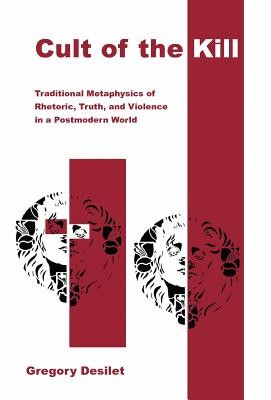
- We will send in 10–14 business days.
- Author: Gregory Desilet
- Publisher: Xlibris
- ISBN-10: 1401063489
- ISBN-13: 9781401063481
- Format: 14 x 21.6 x 2.4 cm, hardcover
- Language: English
- SAVE -10% with code: EXTRA
Reviews
Description
As a thorough introduction to the complex landscape of postmodern language theory, Cult of the Kill examines the latent violence inherent in language as a tool for community formation and deformation. Each chapter examines different ways in which key postmodern thinkers contribute to an understanding of the metaphysical underpinnings of radical conflict and exclusionary scapegoating practices.
The ominous title borrows a phrase made famous by American cultural critic and language theorist Kenneth Burke. Burke claims that within its many resources language introduces one in particular--the negative--that inclines humans toward modes of evaluation and discrimination that offer many seductive avenues toward what Burke calls "congregation by segregation."
Through seductive opportunities for reductionistic varieties of exclusionary and "sacrificial" negation, language induces a fixation on purification with predictable cycles of ritualistic scapegoating violence (both real and symbolic). These cycles of violence permeate individual, social, and cultural levels and, according to Burke, may be justly said to constitute a culture as a "cult of the kill."
The introduction orients the reader toward metaphysical tensions embedded within the structural layers of language that have likely figured in crucial ways in the 20th Century's "cult of the kill" history. It explores the question: To what extent may a less violent future lie in the possibility of a metaphysical choice that departs from the tradition of the use of the negative that Burke identifies? This question bears importantly on questions raised in each of the chapters as these also explore in parallel fashion the apparent controversy between Enlightenment based forms of humanism and rationalism and postmodern trends toward rhetorical and cultural relativism.
EXTRA 10 % discount with code: EXTRA
The promotion ends in 18d.07:47:07
The discount code is valid when purchasing from 10 €. Discounts do not stack.
- Author: Gregory Desilet
- Publisher: Xlibris
- ISBN-10: 1401063489
- ISBN-13: 9781401063481
- Format: 14 x 21.6 x 2.4 cm, hardcover
- Language: English English
As a thorough introduction to the complex landscape of postmodern language theory, Cult of the Kill examines the latent violence inherent in language as a tool for community formation and deformation. Each chapter examines different ways in which key postmodern thinkers contribute to an understanding of the metaphysical underpinnings of radical conflict and exclusionary scapegoating practices.
The ominous title borrows a phrase made famous by American cultural critic and language theorist Kenneth Burke. Burke claims that within its many resources language introduces one in particular--the negative--that inclines humans toward modes of evaluation and discrimination that offer many seductive avenues toward what Burke calls "congregation by segregation."
Through seductive opportunities for reductionistic varieties of exclusionary and "sacrificial" negation, language induces a fixation on purification with predictable cycles of ritualistic scapegoating violence (both real and symbolic). These cycles of violence permeate individual, social, and cultural levels and, according to Burke, may be justly said to constitute a culture as a "cult of the kill."
The introduction orients the reader toward metaphysical tensions embedded within the structural layers of language that have likely figured in crucial ways in the 20th Century's "cult of the kill" history. It explores the question: To what extent may a less violent future lie in the possibility of a metaphysical choice that departs from the tradition of the use of the negative that Burke identifies? This question bears importantly on questions raised in each of the chapters as these also explore in parallel fashion the apparent controversy between Enlightenment based forms of humanism and rationalism and postmodern trends toward rhetorical and cultural relativism.


Reviews